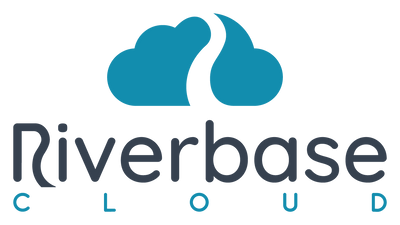AI in Digital Marketing: What You Need to Know
For marketers looking to how to use ai in digital marketing, here's a quick guide:
- Content Creation: Use AI to generate blog posts, social media content, and ad copy
- Data Analysis: Implement AI tools to analyze customer behavior and campaign performance
- Personalization: Leverage AI for custom customer experiences and segmentation
- Advertising: Automate ad targeting, bidding, and optimization
- Customer Service: Deploy AI chatbots for 24/7 customer support
- SEO: Use AI for keyword research and content optimization
Artificial intelligence is changing how businesses approach digital marketing, creating unprecedented opportunities for efficiency, personalization, and growth. By 2030, the worldwide AI market is projected to surpass $1.5 trillion in value, with marketing identified as the domain where AI can contribute the greatest value according to McKinsey analysis.
The rise of AI tools isn't just changing marketing tactics—it's completely reshaping strategies. From generating content and optimizing ads to analyzing customer data and personalizing experiences, AI empowers marketers to achieve more with less effort.
But here's the reality: AI works best as a powerful assistant rather than a replacement for human creativity and strategy. The most successful marketers are those who find the right balance between automation and human oversight.
I'm Gary Gilkison, founder of Riverbase Cloud, where I've helped numerous businesses implement effective strategies for how to use AI in digital marketing through our Managed-AI approach that combines cutting-edge automation with expert human guidance.
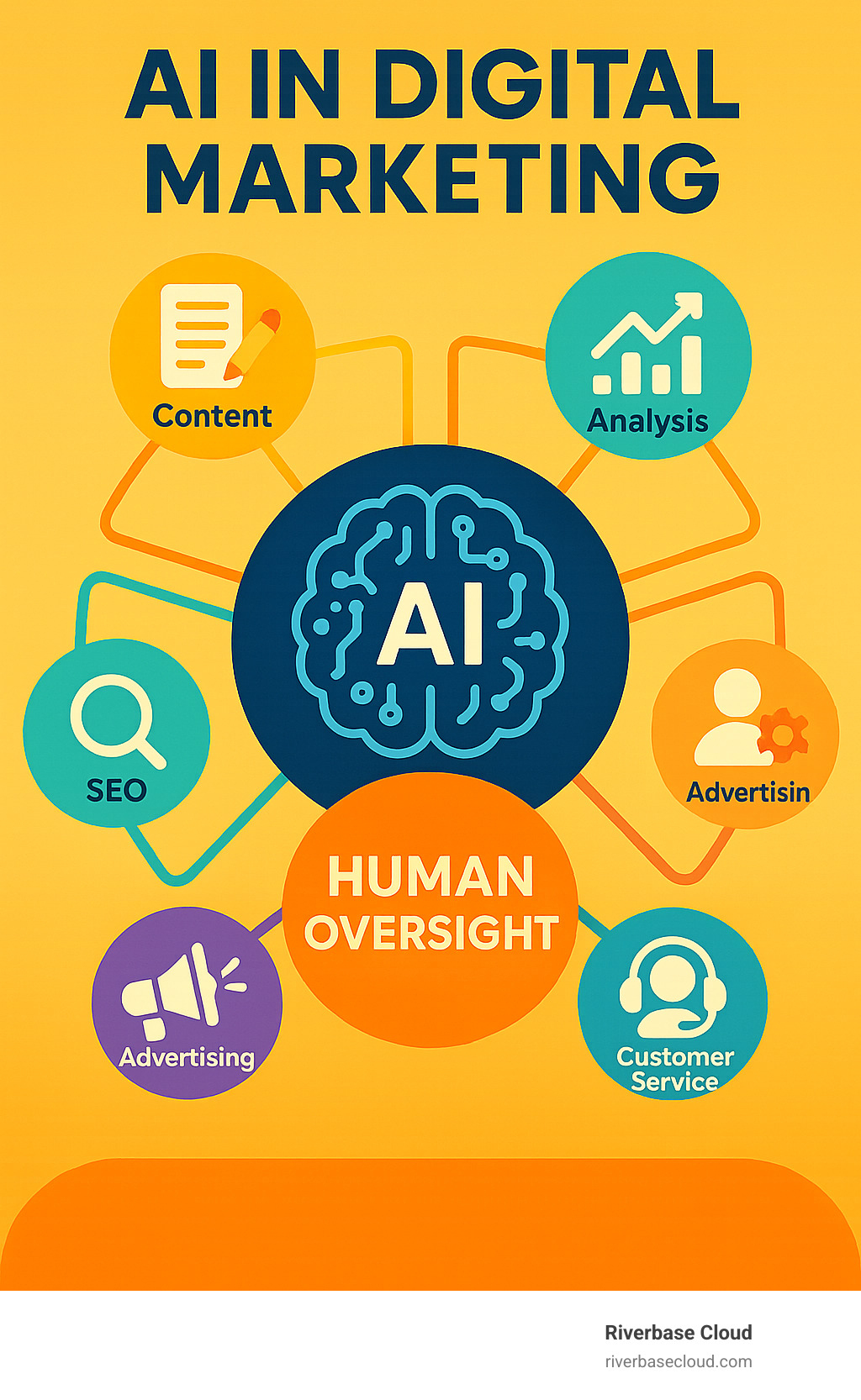
How to use ai in digital marketing terms to remember:
- AI-driven SEO strategies
- Google Ads AI tools
- Digital marketing plumbers
What Is Artificial Intelligence in Digital Marketing?
When we talk about AI in digital marketing, we're looking at something truly transformative – technologies that can analyze mountains of data, spot patterns humans might miss, and make smart decisions automatically to boost your marketing efforts.
Think of AI as your tireless marketing assistant that's constantly learning. It includes machine learning algorithms that get smarter over time, natural language processing (NLP) that understands and creates human-like text, and those impressive large language models (LLMs) like GPT-4 that power many of today's content creation tools.
This isn't just some passing tech trend. A Fortune/Deloitte survey found that 79% of CEOs believe generative AI will boost their efficiency, while 52% see it creating new growth opportunities. And according to McKinsey's analysis of over 400 advanced use cases, marketing stands to gain more value from AI than any other business function!
"AI is radically changing the way brands and consumers interact in ways we've only just begun to explore," notes a recent industry report. We've come a long way from simple automated rules to sophisticated systems that can predict what your customers want before they even know it themselves.
At Riverbase Cloud, we've watched AI transform marketing by:
- Turning vast customer data into actionable insights you can actually use
- Taking repetitive tasks off your plate so you can focus on creative thinking
- Creating personalized experiences for each customer (even when you have thousands)
- Fine-tuning campaigns in real-time to maximize your results
The Key Benefits Marketers Care About
When exploring how to use AI in digital marketing, the advantages go way beyond just saving time (though that's pretty nice too!):
Automation of Repetitive Tasks: Let's be honest – some marketing tasks are tedious but necessary. AI handles the grunt work like scheduling posts, generating reports, and managing email campaigns. The average marketer saves about 2 hours and 24 minutes every day with these tools. Imagine what you could do with that extra time!
Hyper-Personalization: Remember when "personalization" meant just adding someone's first name to an email? AI takes this to a whole new level by analyzing individual behaviors to deliver truly custom experiences. Netflix doesn't just recommend shows you might like – they even customize the artwork you see for each title based on your viewing history!
Predictive Analytics: Instead of always looking in the rearview mirror, AI helps you see what's coming. By predicting future customer behaviors and trends, you can be proactive rather than reactive – identifying your most valuable customers and spotting potential problems before they happen.
Cost Savings: AI helps your marketing dollars work harder by optimizing ad spend and automating routine tasks. Harley Davidson saw a mind-blowing 2,930% increase in leads after implementing AI for digital advertising – while actually reducing their marketing budget!
Competitive Edge: As more businesses adopt AI, those who don't risk falling behind. A 2023 PwC survey found that 81% of CMOs expected to use generative AI to support new business models within 12-18 months. The question isn't if you should use AI, but how quickly you can implement it effectively.
Potential Risks & Challenges
While AI offers amazing benefits, it's important to understand the challenges you might face:
AI Bias: These systems learn from existing data, which means they can sometimes perpetuate or even amplify biases present in that data. This could lead to skewed targeting or messaging that alienates certain customer segments – definitely not what you want!
Data Privacy Concerns: AI needs data to work its magic, which raises important questions about customer privacy and compliance with regulations like GDPR and CCPA. Finding the balance between personalization and privacy is crucial.
Transparency Issues: Some AI systems operate as "black boxes," making it difficult to understand exactly how they reach their decisions. This lack of transparency can undermine trust in your marketing efforts.
AI Hallucinations: Yes, that's the technical term! Generative AI sometimes produces inaccurate or completely fabricated information. In fact, 47% of marketers report experiencing factual inaccuracies from generative AI tools. This is why human oversight remains essential.
Skill Gaps: Many marketing teams simply don't have the technical expertise to implement and manage AI effectively, creating barriers to adoption. Upskilling your team or finding the right partners becomes important.
Regulatory Compliance: As governments develop new AI regulations, marketers need to stay informed about legal requirements in their regions. What's compliant today might not be tomorrow.
At Riverbase Cloud, we tackle these challenges through our Managed-AI approach, blending powerful automation with expert human oversight to ensure your AI marketing is both ethical and effective. We believe AI should amplify human creativity, not replace it.
How to Use AI in Digital Marketing: Core Applications
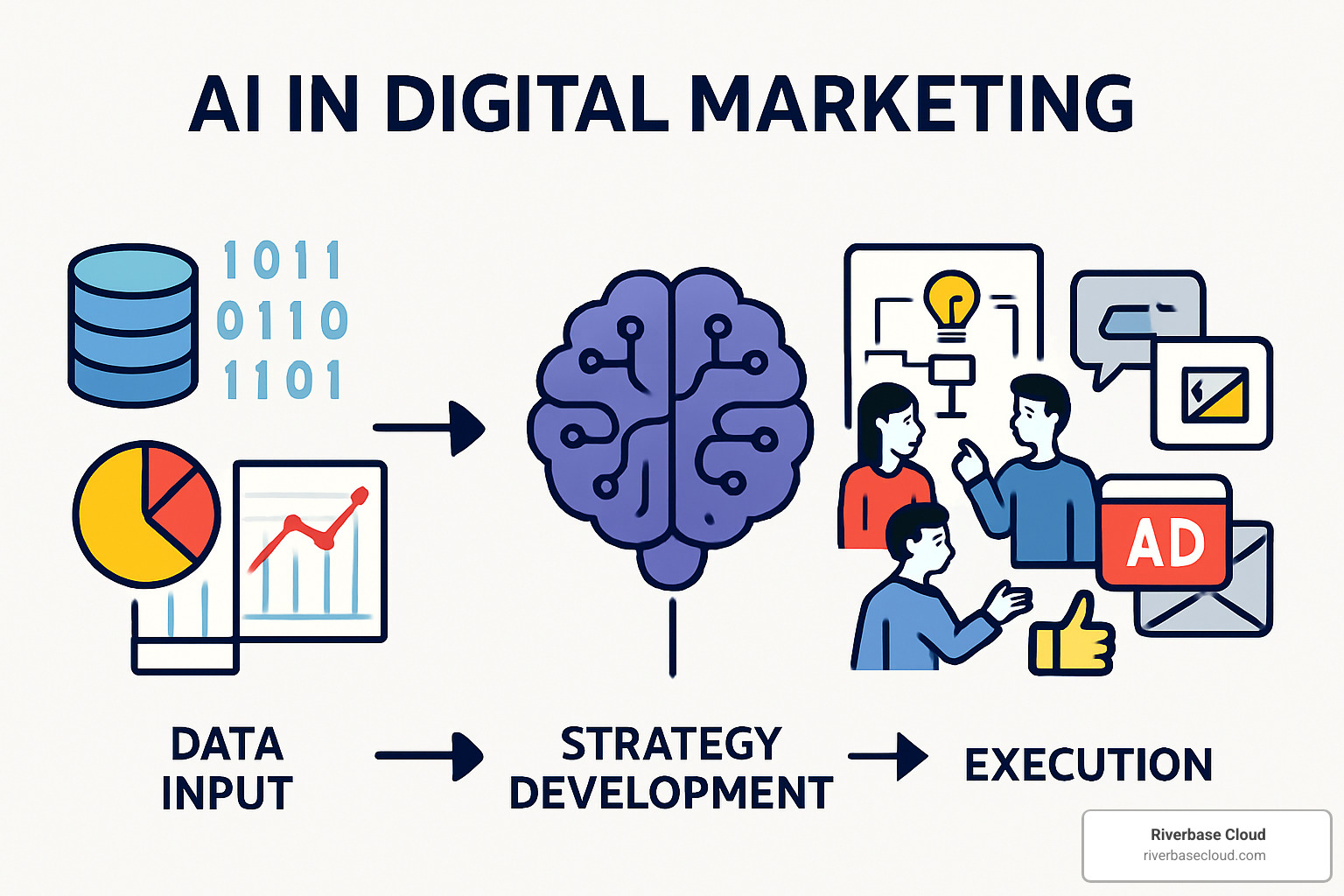
Ready to dive into how to use AI in digital marketing for your business? I've found that the most successful implementations follow a thoughtful, strategic approach rather than just chasing the latest shiny AI tool.
Think of AI implementation like planting a garden—you need the right soil (your data), the right tools (AI platforms), and a clear vision of what you want to grow. Here's the roadmap we use with our clients at Riverbase Cloud:
First, define clear objectives that align with your business goals. Are you trying to increase leads, improve customer retention, or boost content production? Knowing your "why" helps select the right AI tools for the job.
Next, take time to audit your data infrastructure. AI is only as good as the data it learns from—just like you can't make a gourmet meal with spoiled ingredients. We often help clients clean up their data before implementing any AI systems.
When you're ready to begin, start with pilot projects rather than overhauling everything at once. I've seen too many businesses get overwhelmed by trying to implement AI across their entire marketing department overnight. Pick 2-3 focused initiatives where you can measure clear results.
Perhaps most importantly, maintain human oversight at every step. AI is an incredible assistant, but it needs your expertise and creativity to truly shine. Think of AI as your marketing co-pilot, not your autopilot.
Finally, measure and refine continuously. The beauty of AI systems is they get better over time with the right guidance. Set up regular review cycles to analyze performance and make adjustments.
Now, let's explore the specific areas where AI can transform your marketing efforts:
How to Use AI in Digital Marketing for Content Creation & SEO
Content creation is where many marketers first experience the "wow" moment with AI. Nearly half of marketers (44.4%) now use AI for content production, and it's easy to see why.
AI-powered content tools have evolved dramatically in recent years. Whether you're using ChatGPT, Jasper, or Content at Scale, these platforms can help you break through writer's block and generate everything from blog outlines to social media captions.
I was working with a home services client who struggled to maintain their blog schedule. Once we implemented AI assistance, they went from publishing twice monthly to twice weekly—without sacrificing quality. The key? They used AI as a creative partner, not a replacement.
As one content strategist told me, "Only 6% of marketers publish AI-generated content without any human edits." This reflects what we've learned at Riverbase Cloud—AI excels at research and first drafts, but human creativity and brand voice need to guide the final product.
Semantic analysis is another game-changer for content strategy. Instead of guessing what topics might resonate, AI tools can analyze thousands of high-performing articles in your niche to identify patterns, topic gaps, and question clusters that your audience is searching for.
For SEO optimization, AI now handles tasks that used to take hours in minutes. From identifying keyword opportunities to suggesting content improvements, these tools help you stay competitive in increasingly crowded search results.
Our SEO Evolution article puts it well: "AI doesn't replace SEO expertise—it amplifies it by handling routine tasks while humans focus on strategy and creativity." This hybrid approach is what drives our Managed-AI CONTENT service, where we've seen 30% better results than either AI-only or traditional methods.
AI-Driven Segmentation, Targeting & Personalization
Remember when "personalization" meant just adding someone's first name to an email? Those days are long gone. Today, how to use AI in digital marketing for personalization means creating truly individualized experiences at scale.
Predictive customer modeling has transformed how we understand audiences. Rather than broad demographic buckets, AI can analyze behavioral patterns to identify your highest-value prospects, predict purchase likelihood, and even flag customers at risk of churning—all before these events happen.
I remember working with a specialty retailer who was sending the same promotions to their entire email list. After implementing AI segmentation, they finded five distinct customer groups with very different buying behaviors. Tailoring their messaging to each segment increased their email revenue by 58% in just three months.
Dynamic content personalization takes this a step further by automatically adapting your website, emails, and ads based on individual user behavior. Netflix famously does this by showing different artwork for the same shows based on your viewing history—sometimes showing romantic scenes to some viewers and action scenes to others for the exact same content.
The magic happens when you connect these capabilities with your CRM-AI integration. Now your customer service team knows not just who called, but what their likely concerns are, what products they're most interested in, and the best offers to present—all before picking up the phone.
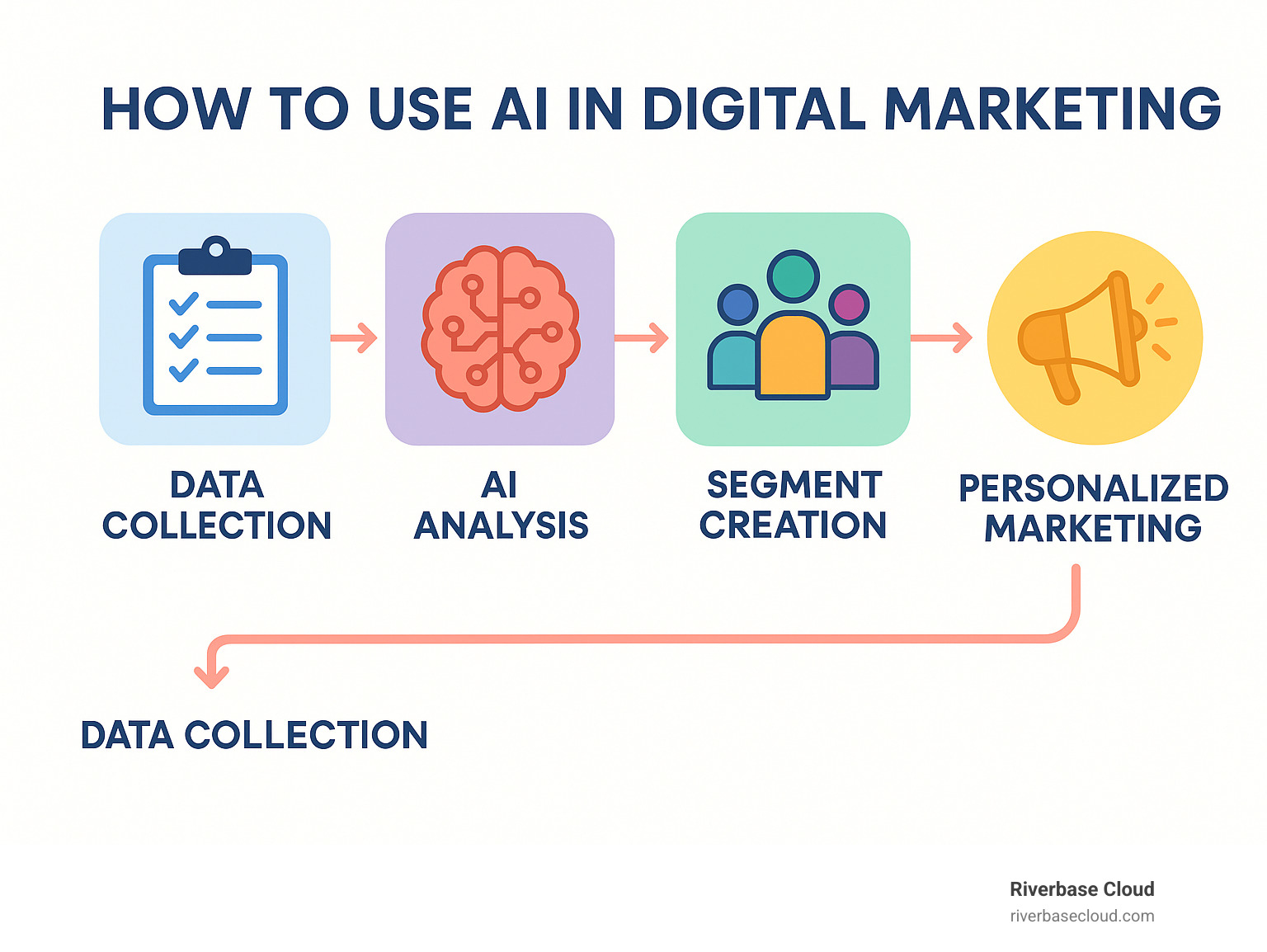
At Riverbase Cloud, we've helped small businesses implement enterprise-level personalization that previously required massive marketing teams. One home service client saw their email engagement jump 42% after implementing our AI-powered segmentation strategy—proof that personalization isn't just for the big players anymore.
How to Use AI in Digital Marketing for Advertising & PPC Automation
If you've ever managed PPC campaigns, you know the frustration of constant bid adjustments, budget allocations, and performance monitoring. This is where AI truly shines.
AI-powered bid management has revolutionized how we handle advertising budgets. Instead of making manual adjustments based on limited data, AI systems can analyze thousands of signals in real-time to optimize your bids. Some businesses report up to 40% increase in conversions alongside a 26% reduction in costs—a win-win that's hard to ignore.
I worked with an e-commerce client who was struggling to manage campaigns across multiple platforms. Their team was spending hours each week adjusting bids and budgets. After implementing our Managed-AI ADS service, not only did their performance improve, but their marketing team reclaimed 15 hours weekly to focus on strategy instead of spreadsheets.
Creative optimization is another area where AI excels. Rather than guessing which headlines or images will perform best, AI can generate and test dozens of variations, learning from each impression to improve results. The system gets smarter over time, continuously refining your ads for maximum impact.
Cross-channel campaign management becomes infinitely more manageable with AI coordination. Whether you're running campaigns on Google, Bing, YouTube, or LinkedIn, AI ensures consistent messaging while optimizing for each platform's unique characteristics.
Our AI-Powered Google Ads article explains it well: "AI doesn't just save time—it identifies opportunities humans might miss while continuously optimizing for maximum ROI." This approach helped one of our e-commerce clients achieve a remarkable 286% increase in keywords ranked and 89% share of voice across their top branded terms.
Analytics & Decision-Making at Speed
The difference between good marketing and great marketing often comes down to decision speed. AI has transformed analytics from looking in the rearview mirror to peering around corners.
Real-time data processing now allows marketers to see campaign performance as it happens, not days or weeks later. This immediate feedback loop means you can spot opportunities or problems as they emerge, rather than after the budget is spent.
One of my favorite client stories involves a regional retailer who launched a new product line. Within hours of their campaign going live, our AI analytics flagged that mobile users were converting at 3x the rate of desktop users. We immediately shifted budget to mobile channels and optimized the mobile experience, resulting in a 72% higher launch ROI than their previous product releases.
Predictive forecasting takes analytics beyond reporting what happened to projecting what will happen. From sales projections to seasonal demand patterns, these models help you prepare for future trends rather than just reacting to past events.
Automated reporting has perhaps saved more marketing marriages than any other AI application. Instead of spending hours creating the same reports each week, AI systems can generate insightful summaries in natural language, highlighting what matters most without drowning in data.
Research from the Turing Institute confirms that AI analytics can now process unstructured data like social comments, reviews, and support tickets to reveal customer sentiment and emerging issues before they become widespread problems.
At Riverbase Cloud, we've made AI analytics a core component across all our services, helping small businesses access insights that were previously available only to enterprises with dedicated data science teams.
Customer Service & Conversational AI
The days of frustrating automated phone trees are giving way to sophisticated conversational AI that can actually understand and help your customers.
Intelligent chatbots have become remarkably human-like in their interactions. With 88% of consumers having interacted with a chatbot in the last year, these AI assistants have moved from novelty to necessity. They handle everything from answering FAQs to qualifying leads and processing orders—all while your human team focuses on more complex customer needs.
Natural language processing capabilities mean these systems can understand intent, detect emotion, and respond appropriately across multiple languages. The best implementations can even recognize when a customer is frustrated and seamlessly transfer them to a human agent.
Automated follow-ups keep the conversation going after initial contact. Whether recovering abandoned carts, checking on customer satisfaction, or encouraging reviews, these systems maintain engagement without requiring constant human attention.
One service business we worked with implemented our conversational AI solution and saw both efficiency and satisfaction improvements—response times dropped by 80% while customer satisfaction scores rose by 35%. The AI handled routine inquiries while their team focused on building deeper customer relationships.
The best part about implementing how to use AI in digital marketing is that you don't need to be a tech giant to benefit. At Riverbase Cloud, we've helped businesses of all sizes harness these powerful tools through our Managed-AI approach, combining cutting-edge technology with the irreplaceable human touch that turns good marketing into great marketing.
Choosing the Right AI Tools & Platforms for 2024
Navigating the sea of AI marketing tools can feel like trying to find a needle in a digital haystack. With new options popping up daily, how do you know which ones are worth your time and budget? Let's break this down into something more manageable.
When evaluating AI tools for your marketing stack, think about what matters most to your business. Does the platform play nice with your existing tools? Is it intuitive enough that your team won't need a computer science degree to use it? What about data security—will your customer information be protected?
Before you commit to any AI platform, I recommend taking these practical steps:
- Get crystal clear on what problems you're trying to solve
- Test drive free versions before opening your wallet
- Focus on one high-impact application first (crawl before you run!)
- Set specific metrics to measure success
- Scale up only after you've proven the concept works
Top All-Rounder Suites
If you're looking for the Swiss Army knife of AI marketing tools, all-in-one platforms might be your best bet.
Our Riverbase Cloud Platform combines content creation, SEO optimization, ad management, and analytics—all with human experts making sure the AI doesn't go off the rails. It's particularly well-suited for small to medium businesses who want the benefits of AI without needing to become technical experts themselves.
Many businesses are finding value in CRM-AI integrations like Salesforce Einstein and HubSpot, which weave artificial intelligence throughout the customer journey. From identifying your hottest leads to personalizing communications, these tools help you work smarter, not harder.
Traditional marketing automation platforms haven't been left behind either. Tools like Marketo and ActiveCampaign now incorporate AI capabilities that make email optimization, customer segmentation, and campaign management more efficient than ever.
The big advantage of these comprehensive suites? Your data lives in one place, and your workflows don't require constant jumping between platforms. The potential downside is that they might not be the absolute best at every single function.
Best-of-Breed Specialists
Sometimes you need a specialist rather than a generalist. If you have specific, deep needs in particular areas, best-of-breed tools often deliver more powerful capabilities.
For content creation, platforms like Jasper, Writer, and Content at Scale focus exclusively on generating high-quality written material. They've put all their development resources into this one function, and it shows.
SEO specialists like Clearscope, Surfer SEO, and MarketMuse offer sophisticated content optimization that generic tools often can't match.
When it comes to advertising, dedicated platforms like Albert.ai and Acquisio use advanced AI specifically designed to optimize your ad spend and targeting.
For data lovers, analytics platforms like Tableau (with Einstein) and Power BI (with AI capabilities) provide visualization and insights that can uncover patterns humans might miss.
At Riverbase Cloud, we understand that different businesses have different needs, which is why we offer modular services that can be mixed and matched:
- Managed-AI ADS for those looking to boost their PPC campaigns
- Managed-AI CONTENT for businesses focused on SEO and content creation
- Managed-AI LOCAL for companies wanting to dominate Google Business Profile and local search
| Feature | All-in-One Suite | Best-of-Breed Tools |
|---|---|---|
| Integration | Seamless internal integration | May require custom connections |
| Specialization | Good at many things | Excellent at specific functions |
| Cost | Single subscription | Multiple subscriptions |
| Learning Curve | Learn one platform | Master multiple interfaces |
| Data Flow | Centralized data | Potential data silos |
| Flexibility | Limited to suite capabilities | Mix and match as needed |
In my experience working with dozens of businesses on how to use AI in digital marketing, there's no one-size-fits-all answer. Many companies find that a hybrid approach works best—using an all-in-one platform as their foundation while adding specialized tools for specific needs.
The right choice ultimately depends on your unique business situation, your existing technology, and your team's capabilities. What matters most is finding tools that solve real problems for your business rather than chasing the latest shiny AI object.
Implementation Best Practices & Ethical Guardrails
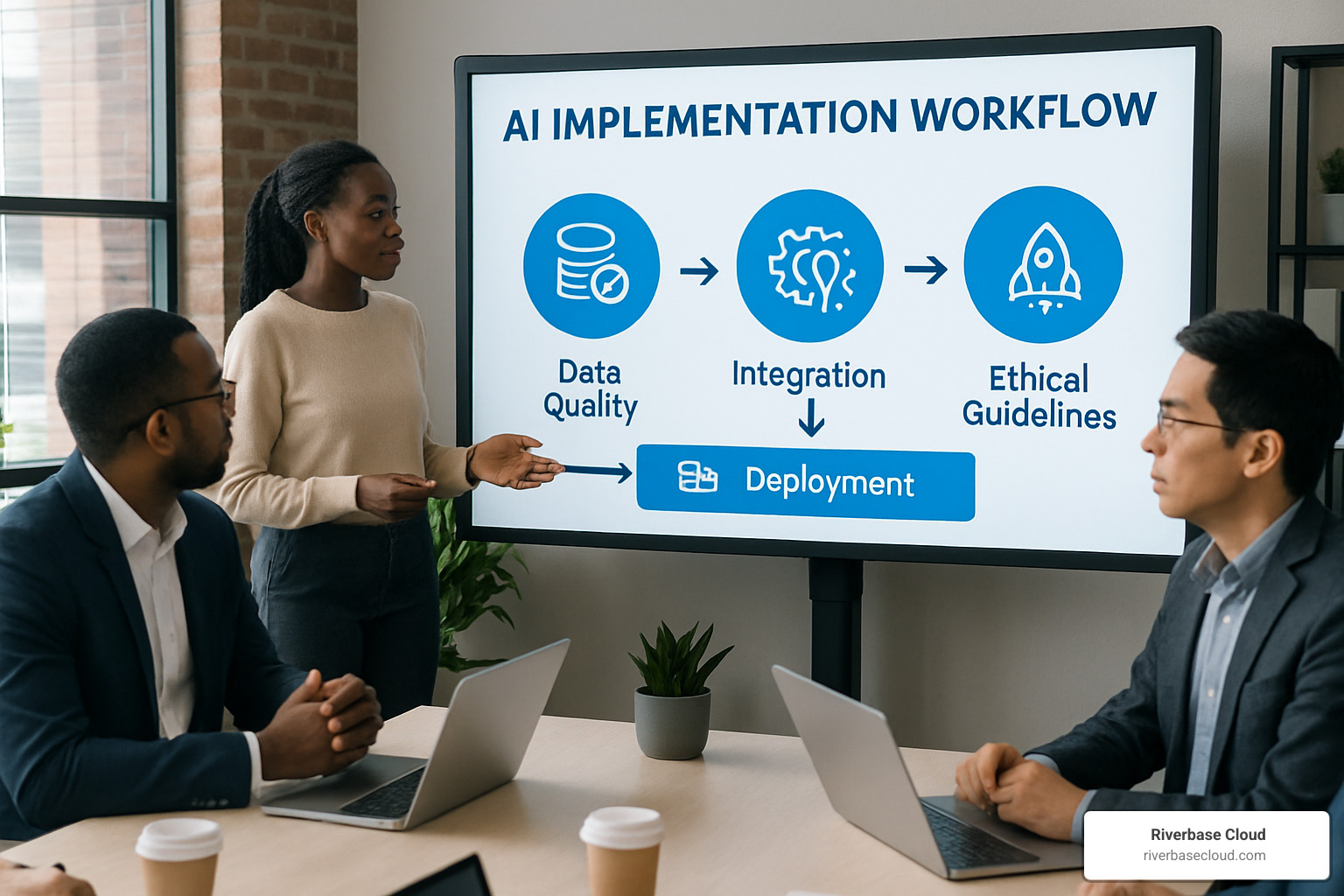
So you've chosen your AI tools, and you're ready to transform your marketing. But hold on—successful implementation isn't just about having shiny new tech. It's about thoughtful integration that respects both your business goals and ethical considerations.
Data quality sits at the foundation of everything AI does. Think of it like cooking—even the fanciest kitchen can't make a delicious meal from spoiled ingredients. Your AI systems need accurate, comprehensive data that's properly structured and privacy-compliant. At Riverbase Cloud, we often see clients struggle not with the AI itself, but with the data feeding it.
Rather than diving headfirst into AI across your entire marketing department, start with focused pilot projects that address specific pain points. I remember working with a client who wanted to implement AI everywhere at once—but by starting with a single campaign that had clear metrics, they demonstrated value quickly and built internal support for broader adoption.
Creating cross-functional teams brings diverse perspectives to your AI implementation. Marketing knows the goals, IT understands the tech limitations, legal keeps you compliant, and content creators ensure the output actually sounds like your brand. This collaborative approach prevents the all-too-common silo effect where AI becomes "that marketing thing" rather than an integrated business solution.
Every AI implementation needs governance frameworks—think of them as guardrails that keep you on the right path. These aren't just bureaucratic checkboxes; they're practical guidelines that outline how you'll use AI, review its output, handle data, and monitor performance. Without these frameworks, it's easy to drift into problematic territory without even realizing it.
Responsible AI isn't just a nice-to-have—it's essential for sustainable success. This means actively working to avoid bias, being transparent with customers about AI use, respecting privacy preferences, and ensuring AI delivers genuine value rather than just automating for automation's sake.
As we explain in our article on Using AI for Smarter Marketing Automation, the real key isn't just implementing AI, but implementing it thoughtfully and strategically.
Building AI Skills Inside Your Team
The most sophisticated AI tools won't help if your team doesn't know how to use them effectively. Training programs should cover both AI fundamentals and specific tools you're implementing. But don't stop at technical training—help your team understand the why behind AI adoption, not just the how.
Prompt engineering has emerged as a surprisingly crucial skill in the AI era. It's not just about typing questions—it's about knowing how to frame requests to get the best possible output from AI systems. I've seen teams get dramatically different results from the same AI tool simply because they learned to craft better prompts.
Encouraging team members to pursue vendor certifications shows your commitment to their professional development while building in-house expertise. These credentials also help your team speak the same language as your AI vendors, making troubleshooting and optimization much smoother.
Perhaps most important is fostering a cultural shift that accepts experimentation and continuous learning. AI tools evolve rapidly, and the teams that thrive are those that view occasional failures as learning opportunities rather than setbacks. One marketing director I worked with put it perfectly: "We don't expect perfection with AI—we expect progress."
At Riverbase Cloud, we don't just implement solutions and walk away. We provide training resources to help your team develop confidence with AI tools, ensuring sustainable results even as technologies evolve.
Keeping Humans in the Loop
Despite all the AI hype, the human touch remains irreplaceable in marketing. Establishing thoughtful content review processes ensures that AI-generated material gets fact-checked, aligns with your brand voice, avoids biases, and benefits from human creativity before reaching your audience.
Brand voice preservation requires special attention in the AI era. Your brand's unique personality can easily get diluted in generic AI outputs. Creating clear guidelines, training AI on your existing content, and having human editors review for tone helps maintain the authentic connection your audience expects.
Compliance oversight isn't the most exciting aspect of marketing, but it's critical—especially with AI. Having humans verify that AI-generated claims meet legal standards, respect privacy regulations, and adhere to industry-specific rules keeps you from facing painful consequences down the road.
Our Managed-AI approach at Riverbase Cloud emphasizes this balance between automation and human expertise. As one client beautifully put it, "What I appreciate most is that the AI handles the heavy lifting, but there's always a human expert making sure everything aligns with our brand and goals."
Finding this balance—where AI improves rather than replaces human creativity—is how you'll truly master how to use AI in digital marketing in a way that drives sustainable growth while maintaining authentic connections with your audience.
Real-World Success Stories & Case Studies
Let's explore some fascinating examples that show how to use AI in digital marketing in action. These aren't just hypothetical scenarios—they're real companies achieving remarkable results.
Harley Davidson transformed their digital advertising approach with Albert.ai and saw something truly extraordinary—site traffic multiplied five times over, while leads skyrocketed by 2,930% per month. What's particularly interesting is that the AI finded valuable audience segments their marketing team hadn't even considered targeting before.
You've probably experienced Netflix's AI at work without even realizing it. Their recommendation engine doesn't just suggest what to watch next—it actually customizes the artwork you see for each title based on your viewing habits. This personalized approach helps Netflix save an estimated $1 billion annually by keeping subscribers engaged and reducing churn.
Even a century-old brand like Coca-Cola has acceptd AI for creative development. Their team used machine learning to analyze thousands of previous ads and generate fresh concepts. The results? One campaign saw a 30% boost in effectiveness by identifying the most compelling messaging combinations.
Home improvement brands are getting in on the action too. Behr Paint created an AI color selection tool that helps customers find their perfect paint color based on their preferences and room characteristics. This clever application increased online conversions by 24% while reducing returns from customers unhappy with their color choices.
Productivity platform ClickUp shows the power of AI for content optimization. By analyzing top-performing content and fine-tuning for search intent, they boosted organic traffic by an impressive 300% in just six months, dramatically improving their SEO performance.
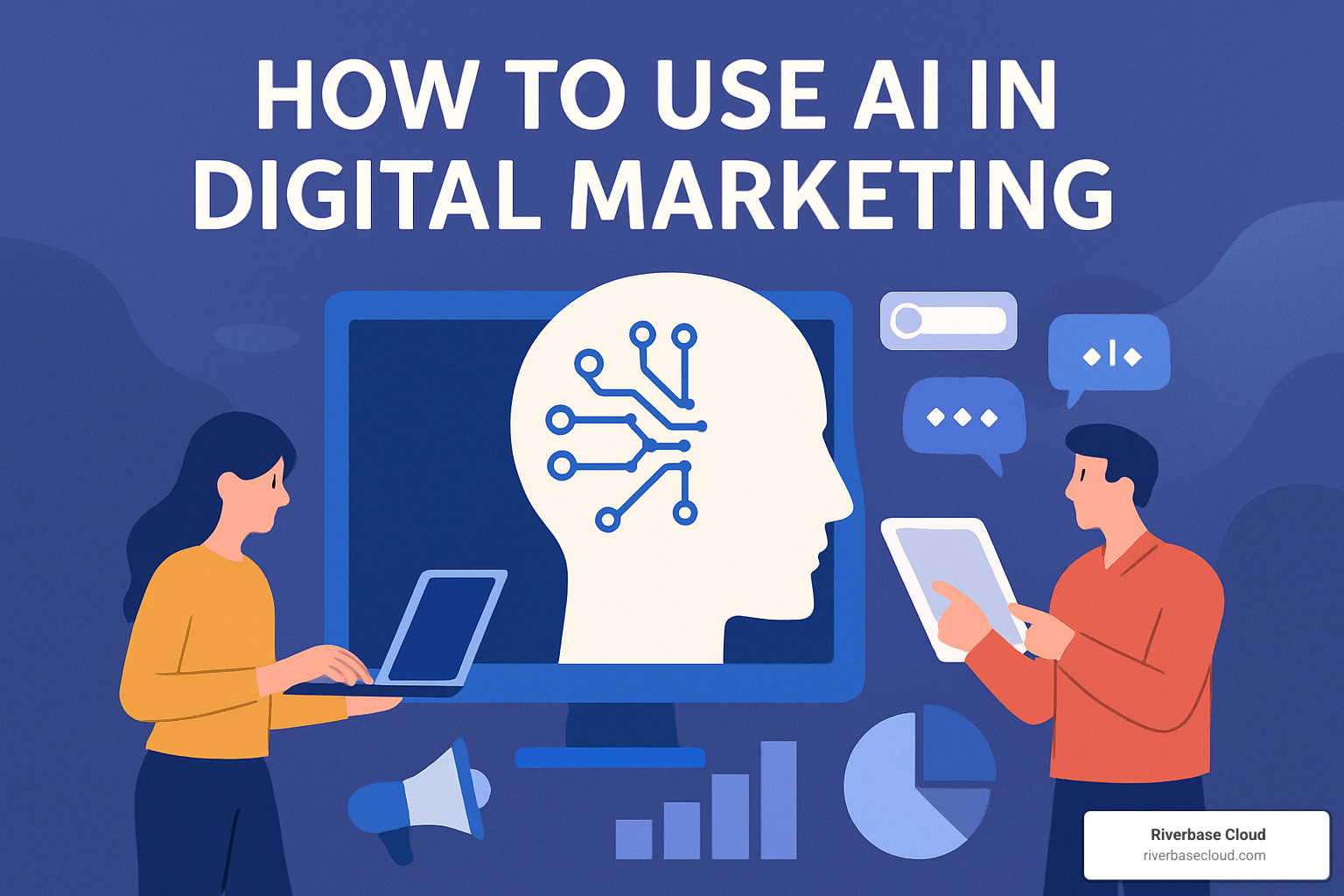
At Riverbase Cloud, we've seen similar success stories with our own clients. What's particularly exciting is that these powerful AI applications aren't just for big corporations with massive budgets anymore. As we explore in our article on AI Marketing Solutions, small and medium businesses can now harness these same capabilities.
Take one of our local service business clients who implemented our Managed-AI LOCAL solution. Within just three months, they saw Google Business Profile conversions jump by 45%. Another client in e-commerce used our Managed-AI ADS service to cut their cost-per-acquisition by 32% while simultaneously increasing conversion volume by 28%.
These success stories highlight an important truth: when implemented thoughtfully, AI doesn't just incrementally improve marketing performance—it can fundamentally transform results. The key is finding the right balance between powerful automation and strategic human oversight, something we're passionate about at Riverbase Cloud.
Frequently Asked Questions about AI & Digital Marketing
Can small businesses afford AI tools?
Yes, absolutely. The AI revolution isn't just for corporate giants with massive budgets. Today's AI landscape offers solutions for businesses of all sizes, with many platforms featuring flexible, tiered pricing that starts as low as $20-50 monthly for essential features.
We've specifically designed our Managed-AI solutions at Riverbase Cloud with small and medium businesses in mind. Rather than overwhelming you with costly, complex systems, we focus on high-impact applications that deliver measurable returns without breaking the bank.
I recently spoke with a local bakery owner who told me, "I always thought AI was this expensive, complicated technology only big companies could use. Working with Riverbase Cloud showed me even my small business can leverage these tools and actually see results without a huge investment." This sentiment echoes what we hear from many small business owners who are pleasantly surprised by AI's accessibility.
How do I measure ROI from AI marketing?
Measuring the return on your AI marketing investment involves tracking both the obvious benefits and the less visible ones that compound over time.
On the direct side, you'll want to monitor improvements in conversion rates, reductions in cost per acquisition, time saved on routine tasks, increases in qualified leads, and improvements in customer retention rates. These metrics typically show up clearly in your analytics.
The indirect benefits, though harder to quantify, are equally valuable: improved customer experiences, faster campaign launches, happier marketing teams (who spend less time on tedious tasks), more confident decision-making, and standing out from competitors who haven't acceptd AI yet.
For meaningful measurement, establish your baseline metrics before implementing AI solutions, then track changes at regular intervals. Most of our clients at Riverbase Cloud begin seeing tangible ROI within 3-6 months of proper implementation—often sooner for specific applications like AI in digital marketing for ad optimization.
Will AI replace human marketers?
No, AI will improve rather than replace human marketers. While AI excels at crunching numbers, spotting patterns, and handling repetitive tasks, it simply can't replicate human empathy, strategic vision, or cultural nuance.
The magic happens when you combine AI's efficiency with human creativity and oversight. As one of our marketing directors put it, "AI handles the science of marketing, giving us more time to focus on the art." I love this perspective because it perfectly captures the complementary relationship.
At Riverbase Cloud, we've consistently seen that teams who view AI as a collaborative partner rather than a replacement achieve the most impressive results. The marketers who will thrive in the coming years aren't those who resist AI, but those who learn to work alongside it—leveraging its analytical power while applying distinctly human skills like empathy, storytelling, and ethical judgment.
The future of how to use AI in digital marketing isn't about replacing people—it's about empowering them to do more meaningful, creative work while automation handles the rest.
Conclusion
As we've explored throughout this guide, how to use AI in digital marketing involves finding the right balance between powerful automation and human expertise. The marketing landscape isn't asking you to choose between AI or humans—it's inviting you to create something more powerful when they work together.
I've seen how this balance transforms businesses of all sizes. The most successful marketers aren't those who blindly adopt every new AI tool, but those who thoughtfully integrate automation while preserving the human elements that make marketing truly connect.
The horizon looks incredibly promising. Hyper-personalization continues to evolve beyond simple name insertions to truly individualized experiences across every customer touchpoint. Multimodal AI that seamlessly blends text, image, and voice capabilities is making customer interactions feel more natural and engaging than ever before.
Predictive analytics is becoming so sophisticated that it's shifting marketing from reactive to genuinely proactive—imagine addressing customer needs before they even express them. And as consumers and regulators increasingly demand transparency, ethical AI frameworks are becoming not just nice-to-have but essential components of any marketing technology stack.
At Riverbase Cloud, we're passionate about helping businesses steer this evolving landscape through our Managed-AI approach. While AI certainly accelerates growth, we've consistently found that the human touch drives lasting success—that's why our solutions combine cutting-edge automation with expert oversight that keeps your brand voice authentic and your strategy aligned with your unique goals.
Whether you're just dipping your toes into AI marketing or looking to refine your existing strategies, we offer flexible, transparent solutions without trapping you in long-term commitments. Our Managed-AI ADS services and other AI-powered solutions deliver measurable results while keeping your marketing seamless and, dare I say, even enjoyable.
The AI revolution in digital marketing is really just beginning. By implementing the strategies we've discussed and maintaining that crucial balance between smart automation and human creativity, your business can stay ahead of the curve. More importantly, you can achieve sustainable growth that feels authentic to your brand and resonates with your audience in an increasingly competitive landscape.
The future belongs to those who understand that AI isn't the destination—it's the vehicle that gets us to more meaningful, effective, and human marketing.
